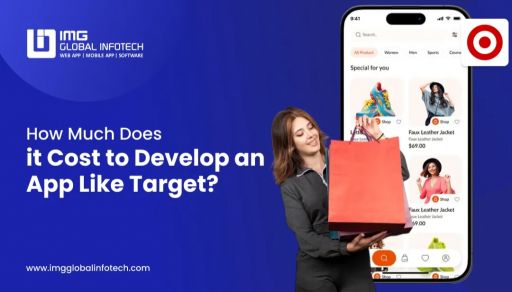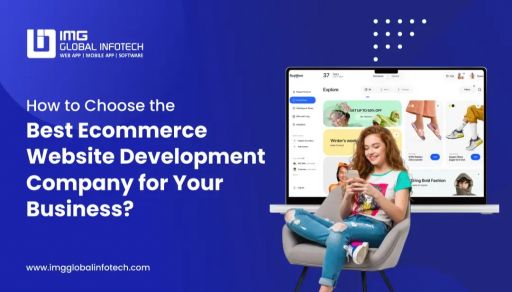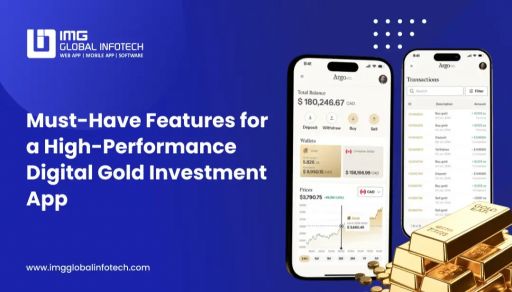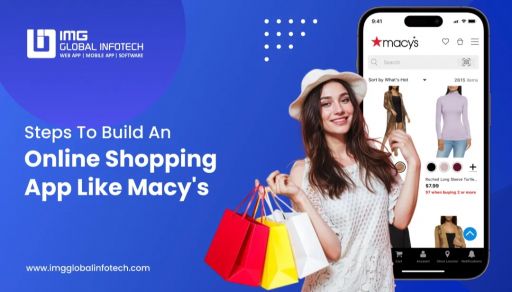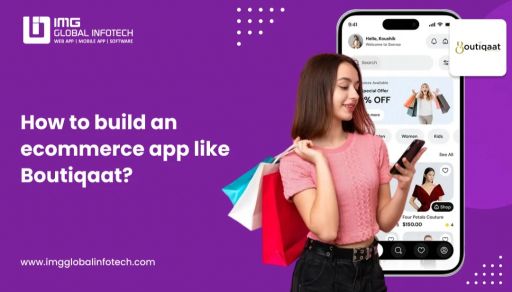Top 15+ Ecommerce Apps You Must Know In 2026
Dipti Singhal
Nov 20, 2025
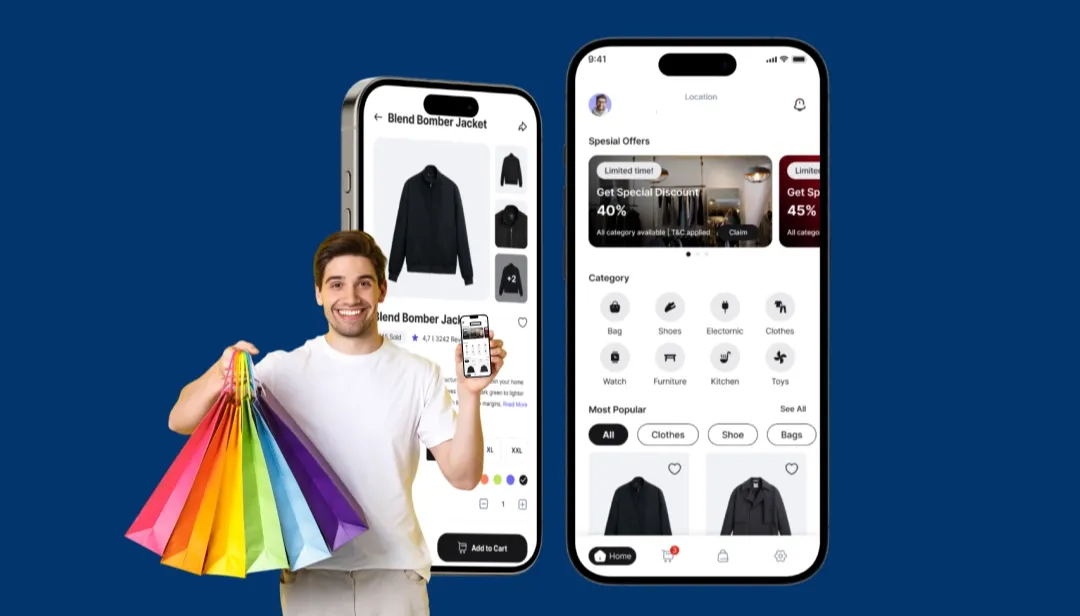
The global eCommerce industry has experienced remarkable growth in recent years, with mobile apps playing a pivotal role in transforming how people shop. From daily essentials to luxury goods, everything is now just a tap away. Leading shopping apps like Amazon, Alibaba, and Flipkart have set high benchmarks by offering seamless navigation, secure payments, and lightning-fast deliveries. In today's era of online shopping, the competition is stronger than ever, with both global giants and regional leaders dominating the market.
In this blog, we explore the top 10+ shopping apps that are reshaping the way consumers shop worldwide. We’ll cover their unique features, popularity, and what makes them stand out in the fast-paced online retail industry.
Online eCommerce Market Statistics
The eCommerce app development industry continues its upward trajectory, driven by mobile-first shopping experiences, improved logistics, and global digital adoption. Here are some key insights for 2026:
-
Global eCommerce Sales are projected to reach $7.9 trillion by the end of 2026 (Statista).
-
Mobile Commerce (mCommerce) accounts for over 73% of total eCommerce sales globally.
-
Asia-Pacific remains the largest eCommerce market, with China leading at over $3 trillion in sales.
-
North America and Europe maintain steady growth, with the U.S. eCommerce sales expected to cross $1.4 trillion in 2026.
-
Online grocery sales are expected to grow at a CAGR of 25% between 2026–2028.
-
Cross-border eCommerce accounts for 22% of total eCommerce transactions worldwide.
-
Top categories: Fashion, Electronics, Health & Beauty, and Home Essentials dominate online sales.
Top 15+ Online Shopping Apps For 2026
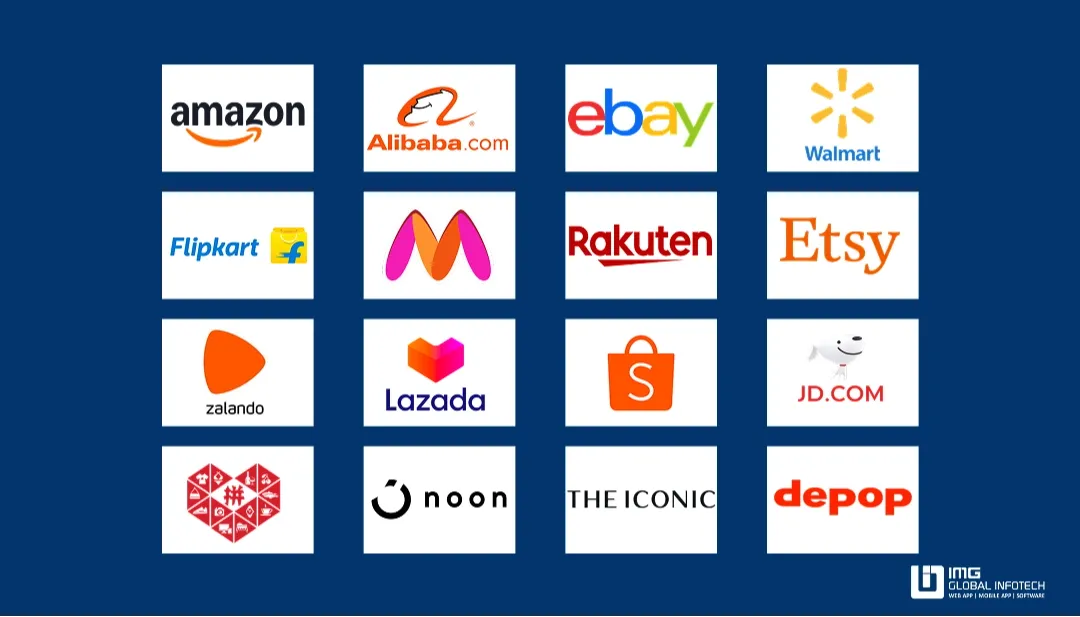
The d2c, b2b eCommerce app industry is shaped by innovation, customer-centric design, and region-specific strategies. Below is an in-depth look at the most popular eCommerce apps globally, with their unique features that make them stand out. Here is online shopping apps list:
1. Amazon
Amazon continues to lead the global eCommerce market, offering a massive selection across electronics, fashion, books, groceries, and more. Its AI-powered recommendations, fast delivery, and strong customer service make Amazon like online shopping apps the first choice for millions of shoppers. Check also: How to Create a Marketplace Like Amazon?
Key Features:
-
Amazon Prime for fast delivery and exclusive offers
-
AI-driven personalized product suggestions
-
Secure one-click checkout
-
Global marketplace with multiple currencies
-
Amazon Pay for seamless transactions
2. Alibaba
Alibaba dominates global wholesale and retail, connecting manufacturers and suppliers with buyers around the world. It is one of the best clothing apps and a go-to platform for businesses seeking bulk orders at competitive prices.
Key Features:
-
B2B and B2C marketplace support
-
Wide variety of product categories
-
Competitive wholesale pricing
-
Multi-language and multi-currency support
-
Integrated payment through Alipay
3. eBay
eBay has been a pioneer in online shopping, particularly in auctions and resale markets. This cheap shopping app allows users to buy new, refurbished, and pre-owned items ranging from electronics to rare collectibles. Its global shipping program and bidding system make it a preferred marketplace for unique items and second-hand goods.
Key Features:
-
Auction-based and direct purchase options
-
Global shipping program
-
Product authenticity checks for select categories
-
Seller rating and feedback system
-
Buyer protection policy
4. Walmart
As one of the largest retailers in the world, Walmart’s app bridges the gap between offline and online shopping. Users can order groceries, electronics, furniture, and clothing, with options for instant delivery and store pickup. Walmart’s competitive pricing and integration of financial services enhance its popularity, especially in the U.S.
Key Features:
-
Grocery ordering with same-day delivery or pickup
-
Rollback deals and seasonal sales
-
Easy order tracking and returns
-
Integrated pharmacy and financial services
-
Walmart Pay for secure checkout
5. Flipkart
Flipkart is one of the best shopping apps in india, offering an extensive catalog of products from electronics and appliances to books and fashion. Known for its “Big Billion Days” sales and exclusive product launches, Flipkart has a strong regional focus, catering to the preferences of Indian consumers with localized payment options like cash on delivery and UPI integration.
Key Features:
-
Big Billion Days and frequent discount events
-
EMI and cash-on-delivery payment methods
-
Wide range of electronics and fashion items
-
AI-powered product recommendations
-
Easy returns and refunds
6. Myntra
Myntra is the best shopping app for girls, specializing in fashion, beauty, and lifestyle products, it is a household name in India. The app offers curated collections, seasonal discounts, and branded partnerships. Its virtual try-on feature, personalized recommendations, and smooth checkout process create a seamless fashion shopping experience.
Key Features:
-
Curated fashion collections
-
Virtual try-on and size guide
-
Style recommendations from experts
-
Seasonal and brand-specific sales
-
Smooth returns and exchange policies
7. Rakuten
Rakuten, Japan’s largest eCommerce marketplace, offers everything from electronics to groceries. What sets Rakuten apart is its loyalty points program, where shoppers earn “Rakuten Super Points” with every purchase, redeemable for future shopping. The platform has a growing presence in global markets, including the U.S. and Europe.
Key Features:
-
Rakuten Super Points rewards system
-
Wide range of products from electronics to fashion
-
Exclusive member discounts
-
Multiple delivery and pickup options
-
International shipping services
8. Etsy
Etsy has carved out a unique space in eCommerce by focusing on handmade, vintage, and custom items. From handcrafted jewelry to personalized home décor, the app attracts buyers looking for one-of-a-kind products. This online purchase app is global marketplace empowers small business owners and artisans to reach customers worldwide. Check Also: How to Build A Ecommerce Website Like Etsy?
Key Features:
-
Marketplace for handmade and custom goods
-
Personalized product discovery
-
Secure seller-buyer communication
-
Global reach for niche products
-
Seller shop customization tools
9. Zalando
Zalando is Europe’s largest online fashion retailer, featuring a vast selection of apparel, footwear, and accessories. The Zalando like ecommerce app offers advanced filtering, free returns, and personal stylist recommendations, making it a go-to choice for fashion-conscious shoppers. Zalando also emphasizes sustainability by promoting eco-friendly brands.
Key Features:
-
Wide range of apparel and accessories
-
Free returns and exchanges
-
AI-based fashion recommendations
-
Sustainability-focused collections
-
Personal stylist services
10. Lazada
Operating across Southeast Asia, Lazada provides access to millions of products across categories like fashion, electronics, and household essentials. Backed by Alibaba, Lazada benefits from robust logistics and competitive pricing. Its flash sales, voucher programs, and integrated payment systems make it a good shopping app and regional favorite.
Key Features:
-
Flash sales and special promotions
-
Multiple payment options including COD
-
Integrated logistics network
-
Mobile-first shopping experience
-
In-app games and rewards
11. Shopee
Shopee is one of the fastest-growing eCommerce apps in Southeast Asia, focusing on mobile-first shopping. Known for its frequent flash sales, in-app games, and free shipping vouchers, Shopee has captured a massive user base. It integrates local payment options and offers seller support to expand product variety.
Key Features:
-
Free shipping vouchers and discounts
-
In-app games to earn shopping rewards
-
Localized language and payment support
-
Daily flash sales and livestream shopping
-
Wide product range from electronics to groceries
12. JD.com
JD.com is a Chinese shoppoing app known for its direct-to-consumer model, which ensures product authenticity and fast delivery. The platform’s advanced supply chain and warehouse systems enable same-day or next-day delivery in many regions. It is particularly strong in electronics, appliances, and consumer goods.
Key Features:
-
Direct-to-consumer sales ensuring authenticity
-
Same-day and next-day delivery options
-
Strong logistics and warehouse network
-
Focus on electronics and home appliances
-
Flexible payment options
13. Pinduoduo
Pinduoduo revolutionized social commerce by introducing group-buying deals, allowing users to invite friends to purchase products together at discounted rates. This gamified approach has made it one of China’s most popular shopping platforms. Its competitive prices attract price-sensitive consumers.
Key Features:
-
Group buying for discounted prices
-
Gamified shopping experience
-
Wide variety of budget-friendly products
-
Social sharing and referral rewards
-
Mobile-first platform
14. Noon
Noon is one of the leading eCommerce apps in the Middle East, offering a diverse product range including fashion, electronics, beauty products, and groceries. Its region-specific pricing, Arabic language support, and quick delivery options have made it a best shopping app and preferred choice across UAE, Saudi Arabia, and Egypt.
Key Features:
-
Arabic and English language support
-
Localized pricing and offers
-
Same-day delivery in major cities
-
Range from electronics to groceries
-
Easy returns and secure payment options
15. The Iconic
The Iconic is Australia’s top fashion, lifestyle and clothes shopping app, known for its curated selection of brands, fast delivery, and easy returns. It has built a reputation for offering premium customer service, personalized shopping experiences, and trend-focused collections.
Key Features:
-
Curated fashion collections from global brands
-
Same-day delivery in select cities
-
Easy returns and exchanges
-
Personalized product recommendations
-
Focus on premium and trendy fashion
16. Depop
Depop is a popular social shopping marketplace that blends eCommerce with a social media-like experience. Known for its focus on vintage, pre-loved, and unique fashion items, Depop has become a go-to platform for Gen Z shoppers and sellers worldwide. The app encourages sustainable shopping by promoting second-hand and upcycled clothing while offering a vibrant community-driven marketplace.
Key Features:
-
Marketplace for vintage, pre-owned, and unique fashion
-
Social media-style interface with profiles, followers, and likes
-
In-app messaging between buyers and sellers
-
Secure payment processing through integrated payment systems
-
Seller tools for listing, promotions, and sales analytics
-
Global shipping support with customizable delivery options
Future Trends in eCommerce App Development
The eCommerce industry is evolving rapidly, and mobile app development is at the center of this transformation. With changing consumer behavior, advancing technologies, and increasing competition, eCommerce apps of the future will focus on personalization, speed, and immersive shopping experiences. Here are the top trends shaping the future of eCommerce app development:
1. AI-Driven Personalization
Artificial Intelligence app development will play a key role in delivering highly personalized experiences. AI algorithms will analyze user behavior, purchase history, and preferences to provide tailored product recommendations, dynamic pricing, and personalized content.
Example: Amazon’s product suggestions and AI-driven marketing campaigns.
2. Augmented Reality (AR) Shopping Experiences
AR technology will make online shopping more interactive by allowing users to virtually try products before purchasing. This will be especially valuable in categories like fashion, beauty, and furniture.
Example: IKEA Place app letting customers visualize furniture in their homes.
3. Voice Commerce
Voice assistants like Alexa, Google Assistant, and Siri are changing the way users shop. Voice-enabled eCommerce apps will allow users to search, compare, and order products using voice commands.
Example: Walmart Voice Ordering through Google Assistant.
4. One-Click & Social Commerce Integration
Social media platforms are becoming eCommerce hubs. Future apps will integrate directly with social platforms for seamless purchasing from posts, stories, and live streams.
Example: Instagram Shopping and TikTok Shop integrations.
5. AI-Powered Chatbots & Virtual Assistants
Smart AI chatbots will enhance customer support, handle queries instantly, and assist in shopping decisions. Virtual shopping assistants will provide real-time support and guide customers through checkout.
Example: Sephora’s chatbot providing beauty recommendations.
6. Sustainable & Ethical Shopping Features
Eco-conscious shopping is on the rise. Future eCommerce apps will highlight eco-friendly products, sustainable brands, and carbon-neutral shipping options.
Example: Zalando’s “Sustainability” filter for eco-friendly products.
7. Faster & Smarter Payment Systems
The integration of digital wallets, Buy Now Pay Later (BNPL) services, cryptocurrency payments, and biometric authentication will make transactions faster and more secure.
Example: Shopify’s integration of Apple Pay, Google Pay, and BNPL options.
8. Headless & Progressive Web Apps (PWAs)
Future eCommerce solutions will use headless architecture to deliver lightning-fast, customizable shopping experiences across devices. PWAs will make online shopping apps work offline and load faster.
Example: Alibaba’s PWA for mobile shopping.
9. Hyper-Personalized Loyalty Programs
Online clothing apps will leverage user data to offer loyalty rewards, discounts, and exclusive deals based on shopping behavior, increasing retention and customer lifetime value.
Example: Rakuten’s Super Points program.
10. AI-Powered Inventory & Logistics Management
Future eCommerce apps will integrate AI-driven demand forecasting, real-time inventory tracking, and same-day delivery systems to improve efficiency.
Example: JD.com’s AI-powered warehouse automation.
Why Invest in eCommerce App Development?
In 2026, mobile commerce dominates the online retail landscape, with a majority of shoppers preferring apps over websites for convenience, speed, and personalized experiences. An eCommerce app not only expands your reach but also builds stronger customer engagement and loyalty.
Key reasons to develop an eCommerce app include:
-
Rising Mobile Usage – Over 73% of eCommerce sales now come from mobile devices.
-
Better Customer Engagement – Push notifications, personalized recommendations, and exclusive deals increase repeat purchases.
-
Improved Brand Visibility – A dedicated app keeps your brand in customers’ pockets.
-
Higher Conversion Rates – eCommerce apps convert at a higher rate than mobile websites due to faster load times and smoother navigation.
-
Enhanced Loyalty & Retention – Features like loyalty programs, offers, and gamification keep customers coming back.
-
Scalability & Growth – Apps can be easily scaled with new features, integrations, and markets as your business grows.
Conclusion
The eCommerce industry is evolving faster than ever, and building a fashion app is no longer just an option, it’s a necessity for staying competitive. From enhanced customer engagement and brand visibility to higher conversion rates, an eCommerce app can transform the way you connect with your customers and grow your business.
At IMG Global Infotech, we specialize in building scalable, secure, and feature-rich eCommerce applications tailored to your business needs. Our expertise in cutting-edge technologies, seamless UI/UX, and post-launch support ensures your app not only launches successfully but continues to thrive in the competitive marketplace.
Dipti Singhal is a skilled Content Writing Specialist at IMG Global Infotech, with strong expertise in creating engaging, SEO-optimized content for various industries. She focuses on blending storytelling with effective keyword strategies to help businesses connect with their audience and improve their online visibility. Passionate about delivering high-quality content that drives real results, Dipti plays an essential role in strengthening the company’s digital presence.


